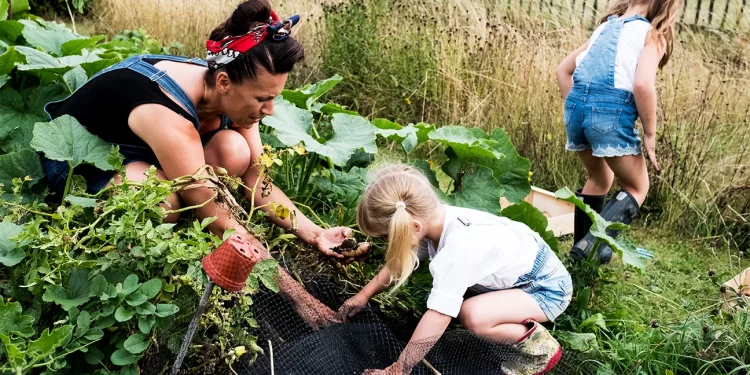Proper soil care is essential for maintaining a healthy and thriving garden all year round. When it comes to nurturing your garden, the foundation lies in the soil. Without nutrient-rich soil, your plants will struggle to grow and produce vibrant blooms or bountiful harvests. By prioritizing soil care, you can create an environment that supports the optimal growth of your plants. Whether you are a seasoned gardener or just starting out, understanding the importance of soil care is crucial for achieving success in your garden.
Understanding the composition of soil
To truly nurture your garden, it is essential to understand the composition of the soil. Soil is made up of various components, including minerals, organic matter, water, and air. The mineral portion provides essential nutrients for plant growth, while organic matter enhances soil structure and fertility. The balance between these components is key to creating a healthy growing environment. By understanding the composition of your soil, you can identify any deficiencies or imbalances and take the necessary steps to improve its quality.
Testing and analyzing your garden soil
Before diving into soil care practices, it is important to test and analyze your garden soil. Soil testing provides valuable information about the nutrient levels and pH balance of your soil. This information allows you to make informed decisions about the specific amendments your soil may need. Testing kits are readily available at garden centers and online. By collecting soil samples from different areas of your garden and following the testing instructions, you can gain insights into your soil’s fertility and composition. Armed with this knowledge, you can tailor your soil care practices to address any deficiencies or imbalances.
Soil amendments for better nutrient content
One of the key aspects of soil care is ensuring that your soil has the right nutrient content to support plant growth. Soil amendments, such as compost, manure, and organic fertilizers, can be used to enhance the nutrient levels in your soil. Compost, for example, is a rich source of organic matter that adds essential nutrients and improves soil structure. Manure from animals like cows or chickens can also be used as a nutrient-rich amendment. Organic fertilizers, made from natural sources, provide a slow release of nutrients to the soil. By incorporating these amendments into your gardening routine, you can replenish the nutrient content of your soil and promote healthy plant growth.
Organic practices for soil care
For gardeners who prioritize sustainability and environmental stewardship, organic practices for soil care are a must. Organic soil care involves the use of natural and sustainable methods to improve soil health. This includes avoiding synthetic fertilizers, pesticides, and herbicides that can harm beneficial organisms in the soil. Instead, organic gardeners rely on compost, cover crops, and crop rotation to improve soil fertility and control pests and diseases. By adopting organic practices, you can create a harmonious ecosystem in your garden that supports the long-term health of your plants and the environment.
Composting for healthy soil
Composting is a fantastic way to enhance soil health and fertility. It involves the decomposition of organic matter, such as kitchen scraps, yard waste, and leaves, into nutrient-rich compost. Compost improves soil structure, enhances moisture retention, and provides a steady release of nutrients to plants. To start composting, you can designate a composting area in your garden or use a compost bin. Add a mix of green (nitrogen-rich) and brown (carbon-rich) materials to your compost pile, and turn it regularly to facilitate decomposition. With time and patience, you will be rewarded with nutrient-dense compost that can be incorporated into your soil to nurture your garden.
Essential Eco-Friendly Practices for Seasonal Cannabis Garden Care
When it comes to eco-friendly seasonal cannabis garden care, sustainability and environmental consciousness are key. Here are some essential eco-friendly practices to consider for nurturing your seasonal cannabis garden:
- Seed Selection and Environmental Match: It’s crucial to select seeds that are well-suited to your local climate and seasonal patterns. Choosing high-quality seeds from cannabis seed companies like Growers Choice Seeds can ensure that the selected strains are better adapted to the specific environmental conditions, promoting eco-friendly cultivation practices. By aligning your seed selection with the natural environment, you can reduce the need for excessive intervention and create a more sustainable garden.
- Natural Germination and Growing Practices: Embracing natural germination methods and sustainable growing practices can significantly contribute to eco-friendly cannabis garden care. Whether you opt for indoor germination or direct outdoor planting, minimizing the use of synthetic chemicals and embracing organic and environmentally friendly alternatives can help reduce the ecological footprint of your garden. Additionally, adopting natural pest control methods and organic fertilization practices can contribute to a more sustainable cultivation approach.
- Environmental Impact Consideration: Prioritizing environmental impact consideration throughout the cultivation process is essential for eco-friendly seasonal cannabis garden care. By assessing the water usage, soil health, and overall ecological impact of your garden, you can make informed decisions to minimize environmental strain and promote sustainable practices. Furthermore, leveraging eco-friendly materials for garden infrastructure, such as composting organic waste and utilizing sustainable irrigation methods, can contribute to environmentally conscious cannabis cultivation.
By integrating eco-friendly practices, prioritizing environmental impact consideration, and selecting high-quality seeds from Growers Choice Seeds, you can establish an eco-conscious approach to nurturing your seasonal cannabis garden, promoting sustainability and responsible cultivation practices. To shop for marijuana seeds near you, visit the Growers Choice Seeds website and browse their extensive selection of premium cannabis seeds.
Mulching techniques for moisture retention
Mulching is a simple yet effective technique for conserving moisture in the soil. By applying a layer of organic mulch, such as wood chips, straw, or shredded leaves, around your plants, you can reduce water evaporation, suppress weed growth, and regulate soil temperature. Mulch acts as a protective barrier, keeping the soil moist and cool during hot, dry periods. It also breaks down over time, adding organic matter to the soil and improving its structure. To mulch your garden, spread a layer of mulch around your plants, making sure to leave a small gap around the stem to prevent rot. Replenish the mulch as needed to maintain an adequate thickness.
Controlling soil erosion in your garden
Soil erosion can be a significant problem in gardens, especially in areas with sloping terrain or heavy rainfall. It occurs when water or wind removes the top layer of soil, taking valuable nutrients with it. To prevent soil erosion and protect your garden, there are several measures you can take. Planting ground covers, such as grass or low-growing plants, helps anchor the soil and reduce erosion. Terracing or creating retaining walls can also help to slow down water runoff and prevent soil loss. Additionally, maintaining a healthy layer of organic mulch on the soil surface acts as a protective barrier against erosion. By implementing these strategies, you can minimize soil erosion and maintain the integrity of your garden.
Seasonal soil care tips
Different seasons require different approaches to soil care. Here are some seasonal soil care tips to help you nurture your garden throughout the year:
Spring:
- Test your soil and amend it accordingly.
- Prepare your garden beds by loosening the soil and removing any weeds.
- Start composting to create nutrient-rich compost for summer.
Summer:
- Mulch your garden beds to retain moisture and suppress weeds.
- Water your plants deeply and regularly, especially during hot and dry spells.
- Monitor for pests and diseases and take appropriate action.
Fall:
- Clean up fallen leaves and debris from your garden to prevent disease.
- Plant cover crops to enrich the soil and prevent erosion.
- Consider adding organic matter, like compost, to prepare the soil for winter.
Winter:
- Protect your soil from erosion by using cover crops or mulch.
- Avoid walking on frozen soil, as it can cause compaction.
- Plan and prepare for the upcoming gardening season.
By following these seasonal soil care tips, you can ensure that your garden remains healthy and productive throughout the year.
Conclusion
In concluion, soil casre is a fundamental aspect of gardening. By understanding the composition of your soil, testing and analyzing it, and implementing soil amendments, you can create an optimal growing environment for your plants. Organic practices, such as composting and mulching, improve soil health and promote sustainability. Additionally, controlling soil erosion and following seasonal soil care tips further contribute to the long-term success of your garden. By truly nurturing your garden’s soil, you are setting the stage for a thriving and beautiful landscape, no matter the season.









